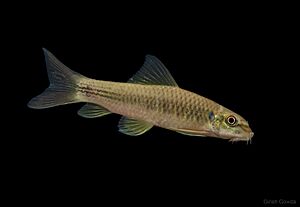Garra mullya facts for kids
Quick facts for kids Garra mullya |
|
|---|---|
 |
|
| Conservation status | |
| Scientific classification |
|
| Kingdom: | Animalia |
| Phylum: | Chordata |
| Class: | Actinopterygii |
| Order: | Cypriniformes |
| Family: | Cyprinidae |
| Subfamily: | Labeoninae |
| Genus: | Garra |
| Species: |
G. mullya
|
| Binomial name | |
| Garra mullya (Sykes, 1839)
|
|
| Script error: The function "autoWithCaption" does not exist. | |
| Synonyms | |
|
|
Script error: No such module "Check for conflicting parameters".
The mullya garra (Garra mullya), also known as the sucker fish, is a type of ray-finned fish. It belongs to a group of fish called Garra. You can find this fish in streams and rivers all over India. However, it is not found in Assam or the Himalayan mountains. There have been reports of it in Nepal, but these have not been officially confirmed.
Contents
About the Mullya Garra
The mullya garra is a fascinating fish known for its special mouth. This mouth acts like a suction cup, helping the fish cling to rocks and other surfaces in fast-moving water. This ability helps it stay in place even when currents are strong. It's a small fish, usually growing to about 10-15 centimeters long.
Its Fish Family
Scientists studied the mullya garra in 2021. They found that it is closely related to another fish called the Ceylon logsucker (G. ceylonensis). This "stone sucker" lives in Sri Lanka. It seems that the ancestors of the stone sucker came from India and moved to Sri Lanka a long time ago. The study also suggested that the mullya garra itself might actually be two different species. These two groups live in areas that are next to each other but don't mix much.
Where the Mullya Garra Lives
This fish lives in many river systems across southern India. You can find it in big rivers like the Tapti, Narmada, Mahanadi, Godavari, Krishna, and Kaveri. It lives in both mountain streams and rivers in flatter areas. The mullya garra seems to be quite tough. It can live even in rivers that have some pollution, like the Bhadra and Mula-Mutha rivers.
However, this fish is sensitive to certain chemicals. For example, a survey in 2011 found that it disappeared from streams near Kasaragod. This happened after a chemical called endosulfan was sprayed on nearby cashew farms.
Reproduction and Life Cycle
The mullya garra usually breeds during the winter months, from December to January. When it's time to lay eggs, the fish often swims upstream. This journey helps them find good places to spawn, which means laying and fertilizing their eggs.
Its Conservation Status
The mullya garra is not a major target for big commercial fishing companies. However, local people do catch many of them for their own food. This is called subsistence fishing. People often prefer to eat this fish. These local fishing activities do not seem to harm the overall population of the mullya garra.
There are no widespread threats to this species right now. Because of this, the mullya garra is listed as a "least concern" species on the IUCN Red List. This means it is not currently at risk of disappearing. Still, some experts think it would be good to study its population more. This would help make sure it stays safe in the future.
 | Chris Smalls |
 | Fred Hampton |
 | Ralph Abernathy |


